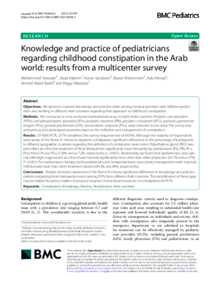Document
Knowledge and practice of pediatricians regarding childhood constipation in the Arab world: results from a multicenter survey.
Identifier
DOI: 10.1186/s12887-022-03536-3
Source
BMC Pediatrics. v. 22, 1, 478
Contributors
Haleem, Azad., Author
Jacobson, Kevan., Author
Al-Shemmeri, Bassel., Author
Al-Enazi, Aziz., Author
Abdel Badei, Ahmed., Author
Massoud, Peggy., Author
Country
United Kingdom.
City
London.
Publisher
BioMed Central Ltd.
Gregorian
2022-12-01
Language
English
Subject
English abstract
Objectives: We aimed to evaluate knowledge and practice styles among medical providers with different professions and working in different Arab countries regarding their approach to childhood constipation. Methods: We conducted a cross-sectional multinational survey in eight Arab countries. Pediatric care providers (PCPs), including pediatric specialists (PSs), pediatric residents (PRs), pediatric consultants (PCs), pediatric gastroenterologists (PGs), general practitioners (GPs), and pediatric surgeons (PSu), were included in our study. The survey was anonymous, and participants provided input on the definition and management of constipation. Results: Of 4000 PCPs, 2579 completed the survey (response rate of 64.5%). Although the majority of respondents were aware of the Rome IV criteria to diagnose constipation, significant differences in the percentage of participants in different geographic countries regarding the definition of constipation were noted. Polyethylene glycol (PEG) was prescribed as a first-line treatment of fecal disimpaction significantly more frequently by pediatricians (PSs, PRs, PCs, PGs) than GPs and PSu (12.8% versus 7.2%, respectively; p 0.001). Additionally, we found that pediatricians used special milk (high magnesium) as a first-choice formula significantly more often than other physicians (53.7% versus 37%, P 0.001). For maintenance therapy, both pediatricians and nonpediatricians used dietary management with a special milk formula more than other treatment options (84.2% and 84%, respectively). Conclusions: Despite increased awareness of the Rome IV criteria, significant differences in knowledge and practice patterns regarding fecal disimpaction exist among PCPs from different Arab countries. The identification of these gaps may be helpful for policy-makers to produce targeted instructional resources on constipation for PCPs.
ISSN
1471-2431
Category
Journal articles

